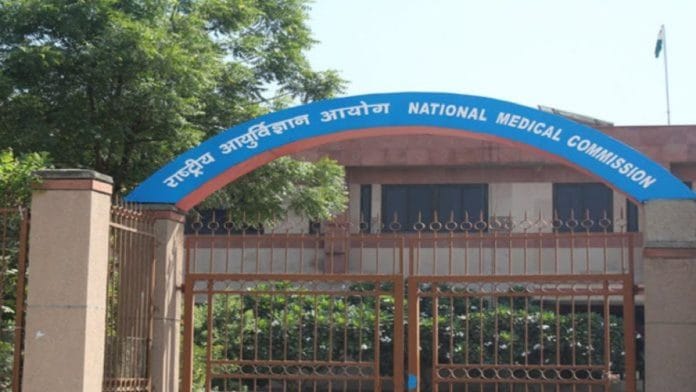New Delhi: Women’s and queer rights activists have praised the National Medical Commission’s (NMC) decision to withdraw the order revising the forensic medicine curriculum for undergraduate medical students. The controversial revision had reinstated topics, including the classification of sodomy and lesbianism as “unnatural sexual offences”, which had previously been removed to make the curriculum more progressive and LGBTQIA+ inclusive.
In a notice issued Thursday night, the apex medical education regulator, said, “It is informed that the Circular issuing Guidelines under Competency Based Medical Education Curriculum (CBME) 2024, stands withdrawn and cancelled with immediate effect. The above guidelines will be revised and uploaded in due course.”
In an order on 31 August, the NMC decided to revise the curriculum, bringing back topics such as the importance of the hymen and its types, the definition of virginity and defloration, and its legitimacy and medico-legal importance—reflecting the conservative idea in India that places the value of a woman’s honour upon an intact hymen and staying a virgin before marriage.
The move had received flak from transgender and disability rights groups and activists who called the content “bigoted”. The groups had reached out to the health ministry seeking urgent intervention to rectify it.
Mario De Penha, the all India head of the LGBTQIA+ vertical of the All India Professionals’ Congress told ThePrint Friday that for the queer community, the withdrawal of the decision means that “pressure on governments and political organisations, as well as autonomous bodies, works”.
He said that it is important to remain alert and condemn homophobia whenever it occurs. Political parties, he said, “can no longer take the queer community for granted, and have to respond to their legitimate demands”.
Meanwhile, he said, “For the NMC, this is an opportunity to educate itself and its members about the LGBTQIA+ community and adopt progressive values on gender.”
Classifying lesbianism and homosexuality as “unnatural sexual offences” and suggesting that consensual adult sex is the same as bestiality “shows not just how regressive the NMC is, but how vulnerable the brightest young minds of India are to the rank prejudice contained in the curriculum,” Penha had told ThePrint Thursday.
Women’s rights activist Kavita Krishnan questioned what the NMC wanted to teach the medical students by bringing the importance of hymen and defloration back into the curriculum. “It would impact the LGBTQIA+ community and women,” she said.
Krishnan said it showed that women are still seen as “human beings without rights”.
“Her (a woman’s) sexual history is not your problem and as a medical professional you become dangerous (if taught this ‘regressive’ topic),” she said.
“This person would be treating women tomorrow and would be the first one to judge them,” she noted.
Rohin Bhatt, a queer rights activist and human rights lawyer, said the earlier revision was “regressive” and would have directly impacted queer, trans and gender-diverse people’s access to their right to health.
“When homophobic, transphobic, ableist thoughts pervade into our medical curriculum, it poses a grave risk not just to queer and trans people but to the general population as well,” Bhatt said.
Revisions should incorporate new ideas, research
Chayanika Shah, another queer rights activist, told ThePrint that, in general, all curricula, including the medical curriculum, should be revised from time to time, however, she said that the revisions should incorporate new ideas and research. “The revision should not be going back on established facts that have evidentiary proof,” said Shah.
Shah said that what the NMC did was a “fully ideological” process, determined by their understanding of sex, gender, and sexuality, and not guided by debates and accepted knowledge.
“I am happy that there was a pushback which was heeded, especially because, through judicial and legislative intervention, this tricky issue of science has been settled as far as India goes unless, of course, some regime undoes the legal system too,” she said. “An idea that may not seem too absurd in present-day India.”
Many of the topics that were reintroduced earlier this week had been removed in 2022 when NMC modified the curriculum taught to undergraduate medical students in accordance with a directive from the Madras High Court. It was to make the curriculum more friendly to the LGBTQIA+ community.
The NMC had removed sodomy and lesbianism as unnatural sexual offences; introduced a distinction between sexual fetishes such as voyeurism, exhibitionism, or masochism, and mental disorders stemming from such atypical interests; and labelled the two-finger test for virginity as “unscientific, inhuman, and discriminatory”.
Students were also going to be trained on “how to apprise courts about the unscientific basis of these tests if a court orders it”, in place of discussions on the medico-legal importance of the hymen that continued to be taught in medical courses despite the Supreme Court ruling it out years ago.
(Edited by Sanya Mathur)
Also Read: ‘Harassment & mental trauma’: Policy body demands probe into issues faced by women wrestlers






